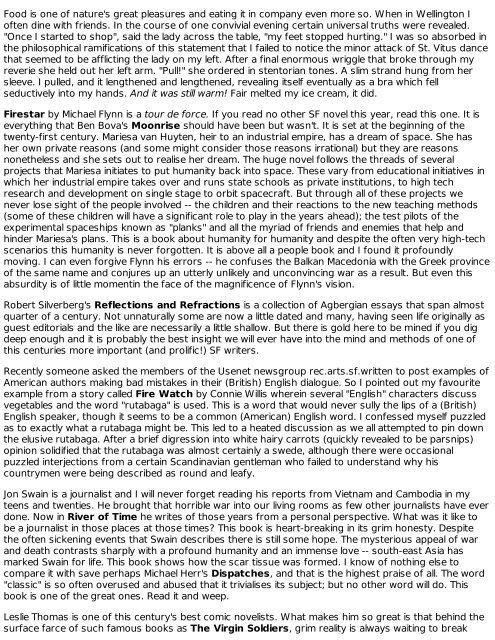Triffids Beard 2 - The Bearded Triffid
Triffids Beard 2 - The Bearded Triffid
Triffids Beard 2 - The Bearded Triffid
You also want an ePaper? Increase the reach of your titles
YUMPU automatically turns print PDFs into web optimized ePapers that Google loves.
Food is one of nature's great pleasures and eating it in company even more so. When in Wellington I<br />
often dine with friends. In the course of one convivial evening certain universal truths were revealed.<br />
"Once I started to shop", said the lady across the table, "my feet stopped hurting." I was so absorbed in<br />
the philosophical ramifications of this statement that I failed to notice the minor attack of St. Vitus dance<br />
that seemed to be afflicting the lady on my left. After a final enormous wriggle that broke through my<br />
reverie she held out her left arm. "Pull!" she ordered in stentorian tones. A slim strand hung from her<br />
sleeve. I pulled, and it lengthened and lengthened, revealing itself eventually as a bra which fell<br />
seductively into my hands. And it was still warm! Fair melted my ice cream, it did.<br />
Firestar by Michael Flynn is a tour de force. If you read no other SF novel this year, read this one. It is<br />
everything that Ben Bova's Moonrise should have been but wasn't. It is set at the beginning of the<br />
twenty-first century. Mariesa van Huyten, heir to an industrial empire, has a dream of space. She has<br />
her own private reasons (and some might consider those reasons irrational) but they are reasons<br />
nonetheless and she sets out to realise her dream. <strong>The</strong> huge novel follows the threads of several<br />
projects that Mariesa initiates to put humanity back into space. <strong>The</strong>se vary from educational initiatives in<br />
which her industrial empire takes over and runs state schools as private institutions, to high tech<br />
research and development on single stage to orbit spacecraft. But through all of these projects we<br />
never lose sight of the people involved -- the children and their reactions to the new teaching methods<br />
(some of these children will have a significant role to play in the years ahead); the test pilots of the<br />
experimental spaceships known as "planks" and all the myriad of friends and enemies that help and<br />
hinder Mariesa's plans. This is a book about humanity for humanity and despite the often very high-tech<br />
scenarios this humanity is never forgotten. It is above all a people book and I found it profoundly<br />
moving. I can even forgive Flynn his errors -- he confuses the Balkan Macedonia with the Greek province<br />
of the same name and conjures up an utterly unlikely and unconvincing war as a result. But even this<br />
absurdity is of little momentin the face of the magnificence of Flynn's vision.<br />
Robert Silverberg's Reflections and Refractions is a collection of Agbergian essays that span almost<br />
quarter of a century. Not unnaturally some are now a little dated and many, having seen life originally as<br />
guest editorials and the like are necessarily a little shallow. But there is gold here to be mined if you dig<br />
deep enough and it is probably the best insight we will ever have into the mind and methods of one of<br />
this centuries more important (and prolific!) SF writers.<br />
Recently someone asked the members of the Usenet newsgroup rec.arts.sf.written to post examples of<br />
American authors making bad mistakes in their (British) English dialogue. So I pointed out my favourite<br />
example from a story called Fire Watch by Connie Willis wherein several "English" characters discuss<br />
vegetables and the word "rutabaga" is used. This is a word that would never sully the lips of a (British)<br />
English speaker, though it seems to be a common (American) English word. I confessed myself puzzled<br />
as to exactly what a rutabaga might be. This led to a heated discussion as we all attempted to pin down<br />
the elusive rutabaga. After a brief digression into white hairy carrots (quickly revealed to be parsnips)<br />
opinion solidified that the rutabaga was almost certainly a swede, although there were occasional<br />
puzzled interjections from a certain Scandinavian gentleman who failed to understand why his<br />
countrymen were being described as round and leafy.<br />
Jon Swain is a journalist and I will never forget reading his reports from Vietnam and Cambodia in my<br />
teens and twenties. He brought that horrible war into our living rooms as few other journalists have ever<br />
done. Now in River of Time he writes of those years from a personal perspective. What was it like to<br />
be a journalist in those places at those times? This book is heart-breaking in its grim honesty. Despite<br />
the often sickening events that Swain describes there is still some hope. <strong>The</strong> mysterious appeal of war<br />
and death contrasts sharply with a profound humanity and an immense love -- south-east Asia has<br />
marked Swain for life. This book shows how the scar tissue was formed. I know of nothing else to<br />
compare it with save perhaps Michael Herr's Dispatches, and that is the highest praise of all. <strong>The</strong> word<br />
"classic" is so often overused and abused that it trivialises its subject; but no other word will do. This<br />
book is one of the great ones. Read it and weep.<br />
Leslie Thomas is one of this century's best comic novelists. What makes him so great is that behind the<br />
surface farce of such famous books as <strong>The</strong> Virgin Soldiers, grim reality is always waiting to break


